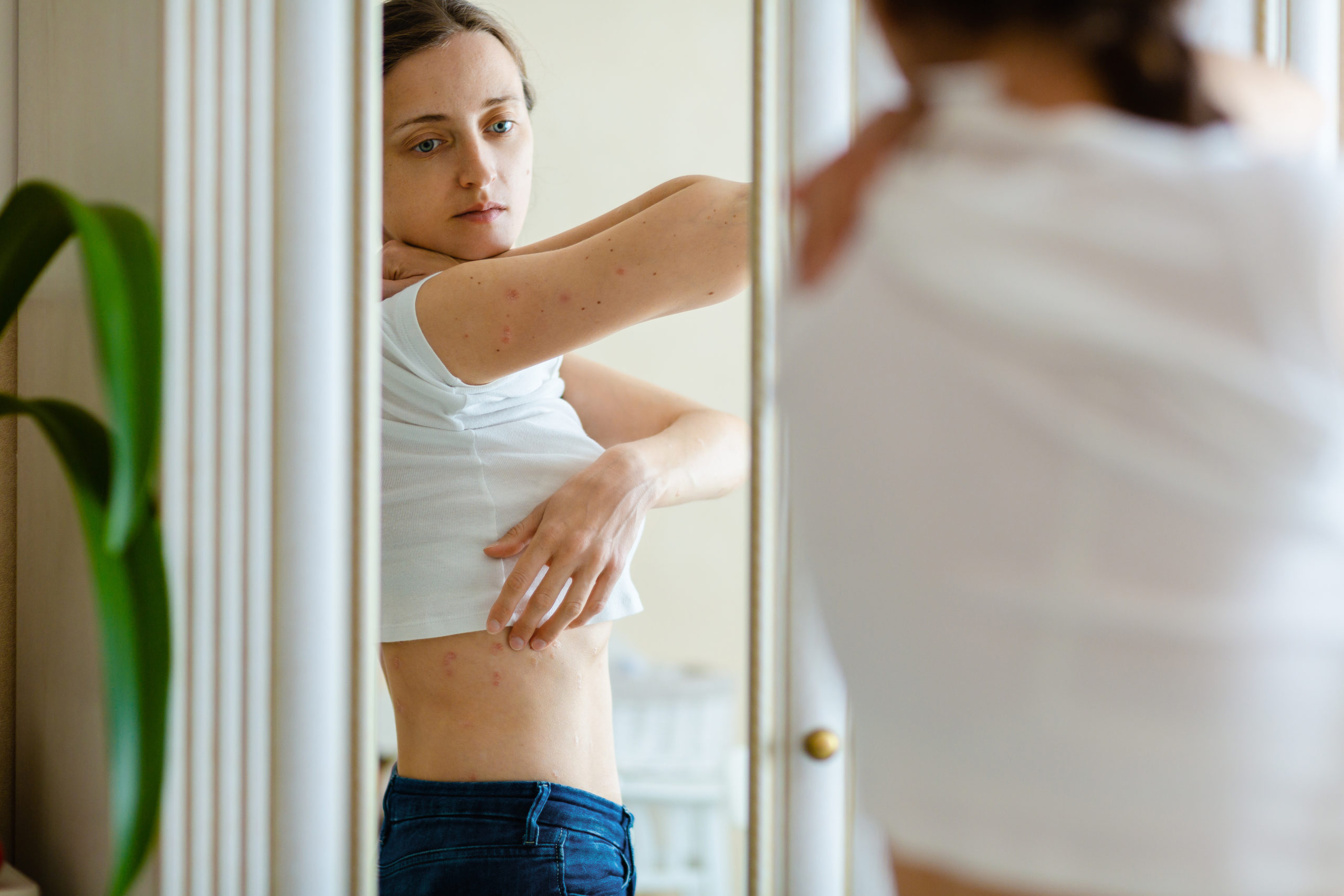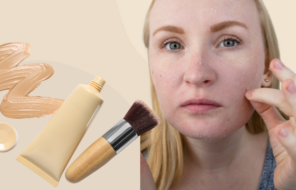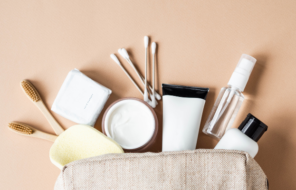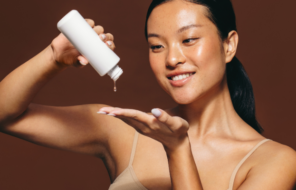Eczema is a noncontagious chronic skin condition that causes dry and itchy skin. It can affect any area of your skin from head to toe. People with eczema can frequently experience inflammation flare-ups when their condition is out of control. Some eczema-prone individuals may feel self-conscious about their appearance or uncomfortable in their skin. Common coping mechanisms include hiding perceived flaws with makeup or full-coverage clothing.
This article aims to enlighten you on treatment options and remedies for eczema. We’ll share helpful do’s and don’ts to safely navigate your eczema journey and provide the ideal gentle skincare regimen for eczema-prone skin.
Note: If dry, patchy skin is something you deal with often, sit down with a skincare professional to explore tailored medical solutions for your condition.
What’s eczema?
Eczema is a chronic skin condition that causes dry, itchy, and patchy skin. Eczema signals that you have relatively sensitive skin, as eczema-prone skin gets irritated easily.
The chronic condition affects over 31 million Americans and peaks during early childhood. That’s why many infants, children, and young adults struggle with eczema as they come of age. The different types of eczema include:
- Atopic dermatitis. Causes rashes and skin discoloration and typically manifests during one’s childhood years. While some outgrow it, flare-ups may follow them through adulthood.
- Contact dermatitis. Occurs when your skin comes in contact with skin irritants, such as poison ivy or environmental toxins. With this type of eczema, allergic reactions trigger potentially painful and itchy skin rashes.
- Neurodermatitis (AKA lichen simplex chronicus). Causes itchiness, scratching, and patchy skin but not at a life-threatening level.
- Dyshidrotic eczema. May cause itchiness, blisters, and a burning sensation.
- Nummular eczema. Produces coin-shaped raised skin bumps. These itchy bumps may sometimes ooze a clear liquid or appear flaky.
- Seborrheic dermatitis. Produces a dry, flaky, red, and itchy scalp and outer skin layer.
- Stasis dermatitis. Causes skin discoloration around your veins.
What are the symptoms of eczema?
The information provided in this article centers around atopic dermatitis since it’s the most common type of eczema. Common symptoms of atopic dermatitis include:
- Rashes
- Itchiness
- Dry, patchy skin
- Swelling
- Discolored bumps
- Sleep discomfort
- Depression and anxiety
- Skin infections
- Food allergies
- Asthma or hay fever
Keep in mind that people experience eczema differently. Some may have more or fewer symptoms depending on the severity of their condition. This explains why certain eczema-prone individuals can use natural home remedies to reduce the symptoms, while others need additional medical attention to achieve the same results. We advise you to consult with a skincare professional for guidance on how to properly address your symptoms.
What are common causes of eczema?
This is where things get dicey, as eczema has a few potential causes. We spoke with Dr. Rosmy Barrios who said it best: “Even the experts themselves do not agree on what causes eczema. Until this changes, it is believed that the disease is caused by a combination of several different factors, such as genetics, environmental influences, skin sensitizing products, and skin damage.” See below for a compiled list of potential causes.
- An overactive immune system triggers skin inflammation, further leading to the possibility of developing eczema-related symptoms, such as painful, itchy rashes.
- Inherited gene variations can weaken the skin’s protective barrier, opening the door for eczema to occur. This impedes the skin’s ability to preserve moisture and self-protect against harmful bacteria and irritants, like fragrances, harsh dyes, rough fabrics, or cleaning chemicals.
- Some people risk getting it if their skin overproduces Staphylococcus aureus, a disease-causing bacteria found on human skin. Excessive S. aureus colonization leaves little room for helpful bacteria that strengthens your skin’s barrier function.
- If you’re allergic to certain foods, your allergic reactions might appear as eczema. Common food allergies that trigger eczema include dairy, nuts, and eggs.
- Animals and pets shed tiny flecks of dead skin cells called dander. Animal dander can trigger eczema if you’re allergic.
- Environmental factors play a role in development as well. Eczema-prone skin reacts negatively to pollen and weather changes, for instance.
- Emotional responses like stress and anxiety don’t just affect your mental health. They release a chemical called histamine that further aggravates and inflames your skin.
How doctors diagnose eczema
Eczema and acne share overlapping symptoms, like skin swelling and discolored bumps. Some people mistakenly treat eczema as if it’s acne through remedies not strong enough to address the condition properly. That’s why you should learn to distinguish the two before deciding on how to combat them.
Before a skincare professional diagnoses you with eczema, they’ll conduct an examination and medical history review. Some doctors administer a patch test to determine whether you have it. According to Barrios, “Patch testing is one of the most popular and effective ways to diagnose eczema.”
Patch testing is useful in detecting the particular allergens behind an eczema diagnosis. The test begins with your doctor applying different substance samplings to your skin and then covering them up to see how your skin reacts. These tests typically last up to a week, and you’ll be in and out of the doctor’s office for in-between testing.
Treatment options for eczema
Eczema doesn’t go away in some cases. However, some people might get lucky and eradicate the symptoms for the rest of their lives. Finding that winning treatment to control your eczema takes trial and error. Even then, getting control of it doesn’t entirely exempt you from flare-ups. Treatments just relieve the symptoms and help prevent outbreaks.
Lack of proper treatment leads to worsening symptoms. In this case, we advise you to get professional help to avoid permanent damage. Ongoing clinical trials exist to discover new options for eczema treatment and prevention. Here are the existing options:
Traditional medicine
When working with a dermatologist or licensed skincare professional, expect them to suggest one or multiple treatment options to target eczema flare-ups. They may include the following:
- Prescribed skincare regimen. These are topical skin repair creams, ointments, or gels with additional routine steps tailored to your skin’s needs.
- Prescribed drugs. In certain cases, eczema may worsen to the point of infection. This is an instance when your doctor might deem it necessary to prescribe oral antibiotics.
- Injectables. You could opt for injectable treatments as an alternative. The options include injectable tralokinumab (Adbry) for adults and dupilumab (Dupixent) for children who are at least 6 years old.
- Wet dressing therapy. This procedure starts with coating the affected area with corticosteroid ointment and wrapping it with wet gauze (and an extra layer of dry gauze) to seal the medicated treatment. Health care professionals trained in wet dressing therapy typically offer this as a service since it can prove difficult to wrap yourself. However, you could ask a health care professional for guidance if you prefer to do it solo.
Alternative medicine
You could also choose the alternative medicine route to ease eczema-related symptoms. As a precaution, this is an option you’ll want to consult with your doctor about before moving forward. Here are some ideas for alternative (integrative) remedies:
- Acupuncture and acupressure. According to research, these treatments might relieve the itchiness that eczema causes.
- Natural oils. Nothing moisturizes your skin quite like natural oils. Coconut and other mineral oils make a great addition to your regular skincare or bathing routine. They’re scientifically proven to reduce the symptoms of eczema.
- Cannabinoids. These might serve as a reliable itch relief medium.
- Manuka honey. Centuries of previous generations have used manuka honey as an antimicrobial (aka infection-preventing) remedy. That’s why it might work some magic when you apply it to your skin. It’s safe for adult use.
- Light therapy. Some people resort to light therapy if they can’t control post-treatment flare-ups with topical medication alone. It entails baring your inflamed skin in controlled natural sunlight to provide short-term relief.
Safe eczema skincare routine
Simple self-care practices work effectively to soothe eczema’s common symptoms, like taking a gentler approach to your skin. Here’s an ideal regimen for sensitive skin:
- Shower or bathe daily. Like your skin, your body needs daily cleansing from bacteria and impurities to minimize eczema-related symptoms. Bathing in warm water is typically best. When soaking in the tub, add colloidal oatmeal to your water. This ingredient can positively impact your skin’s pH and protective barrier function.
- Bleach baths. As awful as it might sound, bleach baths may reduce flare-ups as well. The American Academy of Dermatology approves the use of diluted bleach baths to minimize infections and eczema-causing bacteria. Consult with a medical provider before proceeding with this, however. Bleach baths aren’t for everyone.
- Wash your face with a gentle cleanser. Soaps with harsh chemicals can strip your skin of its natural moisture and oils. Gentle cleansers with zero alcohols, dyes, or fragrances are a safer choice when you have eczema.
- Moisturize two times per day. Go for a product that works best for your skin type (e.g., dry, oily, or combination). Standard moisturizers range from creams and ointments to lotions and oils. Try to apply your moisturizer at an optimal time, like in the morning before you get dressed and in the evening before bed. Avoid moisturizers that contain ingredients that may irritate your skin, like alcohol, fragrances, and dyes.
- Spread anti-itch cream on inflamed areas. Nonprescription creams provide temporary itch relief. The most effective creams are those with the topical corticosteroid, hydrocortisone. All drugstore creams have suggested use instructions on the packaging.
Additional tips
- Avoid scratching. Resist the urge to scratch when you have an itch. It only irritates your skin further. Patting your skin is the safer alternative.
- Keep a humidifier handy. Dry indoor heat is a recipe for disaster with eczema-prone skin. Drier climates dehydrate your skin, making it more prone to itchiness. You can easily add moisture to your home’s interiors with a humidifier.
- Healthily manage stress. Stress and anxiety both negatively affect eczema. You can make yourself and your skin happier by tending to your emotional health.
- Dress for success. Fill your wardrobe with plenty of smooth-surfaced, breathable clothing. Harsh dyes, rough or scratchy materials, and tight clothing can all cause skin irritation. You don’t have to limit yourself to baggy clothing, but it serves you well to make wiser style choices and be more mindful of your sensitive skin when shopping. Lightweight materials give your skin room to breathe. Smoother fabrics are more comfortable and don’t harshly rub against your skin.
- Steer clear of harsh laundry cleaning products. Try to wash your clothes with natural detergents and fabric softeners instead.
Final thoughts
Eczema comes with quite a learning curve that doesn’t end when you discover that you have it. Between the different types of eczema and various treatments available, guidance is necessary when determining your approach to the condition. We hope that this article gave you the ultimate clarity on its symptoms, causes, diagnosis details, and remedies.





